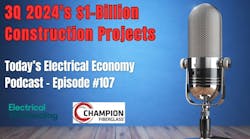Latest from Economic Data
Building permits increase in November. Privately‐owned housing units authorized by building permits in November were at a seasonally adjusted annual rate of 1,328,000, +5% above the revised October rate of 1,265,000. Single‐family authorizations in November hit 848,000, +0.1% above the revised October figure of 847,000.
U.S. ports enjoying boost in cargo. Imports at the nation’s major retail container ports have dipped since peaks seen last fall but remain at higher-than-usual levels as a possible increase in tariffs on goods from China approaches in March, according to the monthly Global Port Tracker report recently released by the National Retail Federation and Hackett Associates.
U.S. ports covered by Global Port Tracker handled 1.97 million Twenty-Foot Equivalent Units (TEU) in December. A TEU is one 20-foot-long cargo container or its equivalent. December’s data was up +8.8% from November and +13.9% year-over-year. Global Port Tracker estimates that U.S. ports will handle 10.7 million TEU in the first half of 2019, up 4.1% over the first half of 2018.
Purchasing Managers Index sees nice spike in January. The Institute for Supply Management’s January Purchasing Managers Index (PMI) registered 56.6%, an increase of 2.3 percentage points from the December reading of 54.3%. The New Orders Index registered 58.2, an increase of 6.9 percentage points from the December reading of 51.3%. Any reading over 50 points indicates that industrial purchasing managers surveyed in ISM’s monthly survey are feeling bullish about the industrial purchasing climate.
Conference Board’s leading indicators starting to sag. The Conference Board’s Leading Economic Index (LEI) for the U.S. declined -0.1% in December to 111.7 (2016 = 100), following a +0.2% increase in November, and a -0.3% decline in October. “The U.S. LEI declined slightly in December and the recent moderation in the LEI suggests that the U.S. economic growth rate may slow down this year,” said Ataman Ozyildirim, the association’s director of economic research. “While the effects of the government shutdown are not yet reflected here, the LEI suggests that the economy could decelerate towards 2% growth by the end of 2019.”









